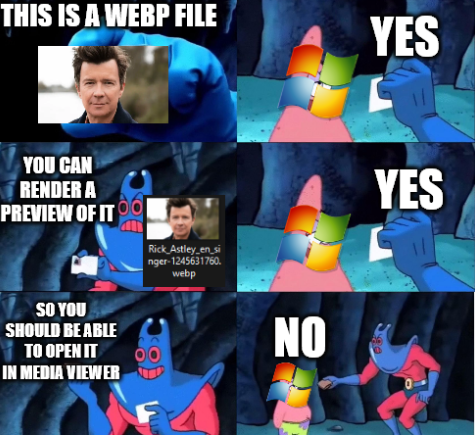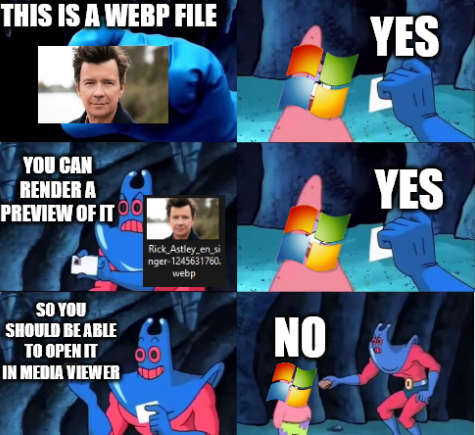I know nothing about computers but this does not add up
-
I guess it's Windows users with the default image viewer. IrfanView on W10 handles webp fine for me.
IrfanView is GOAT. On par with VLC or Firefox IMO.
-
Is this a matter of time, or do most programs never plan to add support?
I do expect it to be a matter of time. Typically, you pull some image rendering library into your program, which pulls in a whole bunch of libraries that support the different image formats.
As such, it's the job of that intermediary library to support as many formats as possible. If you keep that intermediary library up-to-date, you may get support for new image formats without really doing anything.But well, it may take more time for this to happen, for various reasons. One reason is obviously that we already have other image formats that may not be amazing, but they work everywhere, so most people continue to use those.
Another aspect that may slow adoption down, is that .webp was spear-headed by Google alone. Normally, you get other industry leaders into the boat, to make sure you cover everyone's use-cases and have somewhat of a commitment for them to integrate it. I assume that Photoshop supports .webp by now, but it probably took relatively long for that to happen, for example. -
Is this a Windows problem I'm too Linux to understand?
Seriously, everything on my computer -- Firefox, Dolphin, Gwenview, GIMP, etc. -- supports webp just fine.
I’m too Linux to understand?
The advantage of using shared libraries is that you only need the one to support webp system-wide and then all apps that need it have it.
-
Hear me out:
AI-powered webp supportMany more possibility for exploits
-
I do expect it to be a matter of time. Typically, you pull some image rendering library into your program, which pulls in a whole bunch of libraries that support the different image formats.
As such, it's the job of that intermediary library to support as many formats as possible. If you keep that intermediary library up-to-date, you may get support for new image formats without really doing anything.But well, it may take more time for this to happen, for various reasons. One reason is obviously that we already have other image formats that may not be amazing, but they work everywhere, so most people continue to use those.
Another aspect that may slow adoption down, is that .webp was spear-headed by Google alone. Normally, you get other industry leaders into the boat, to make sure you cover everyone's use-cases and have somewhat of a commitment for them to integrate it. I assume that Photoshop supports .webp by now, but it probably took relatively long for that to happen, for example.Superb explanation. Many thanks for the insight Ephera!
-
avif is better than it in almost all ways, and jpex xl is even better than that (but not about gifs i think)
webp is essentially a webm file (which is mkv with codec restrictions(vp8/9 and ogg vorbis or opus))
avif is av1 encoded files in a webp like container (but not webm afaik)
jpeg xl is a format made specifically for images
AV1 is only supported by new devices, most support VP9. For example, the iPad Air 2024 does not support AV1.
-
AV1 is only supported by new devices, most support VP9. For example, the iPad Air 2024 does not support AV1.
yes, but that is a bit apple specific, and on intel side, they support hwdec since 2021. and since these are just images, even software decoding works (although a bit slower)
-
I work in big tech and this is my life. I envy anyone who thinks you're exaggerating, because that means they haven't experienced the joy of spending weeks trying to track down the team responsible for a bug and then months hassling them to fix it.
Oh, man.
I just stopped being hassled to fix a bug on somebody else's system (that mine interops with), by the same developers responsible for maintaining that other system, because the problem got bad enough to escalate until somebody responsible for both sides looked.
That said, I was just ignoring them. But hell...




